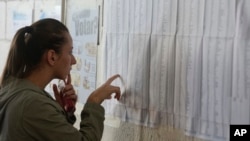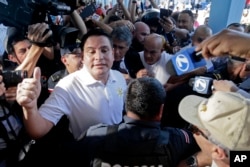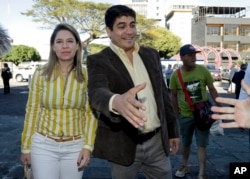Two candidates with the same last name and opposing stances on gay marriage, an issue that came to dominate Costa Rica’s presidential campaign, led election returns and appear headed to a runoff to decide who will be the Central American nation’s next leader.
With 94 percent of the ballots counted Monday, Fabricio Alvarado, an evangelical whose political stock soared after he came out strongly against same-sex marriage, had 24.9 percent of the vote. Carlos Alvarado, the only major candidate to support gay marriage, had 21.7 percent. The two men are not related.
Agri-businessman Antonio Alvarez of the opposition National Liberation Party, who was in third with 18.6 percent, conceded defeat and congratulated the two front-runners.
Costa Rican election rules say that if no one in the 13-candidate field finishes above 40 percent, the top two advance to a runoff that would take place April 1.
The race was shaken up by a January decision by the Inter-American Court of Human Rights that said Costa Rica should allow same-sex couples to wed, adopt children and enjoy other rights afforded to married couples.
Fabricio Alvarado, a journalist, preacher and Christian singer, vaulted from an also-ran in opinion polls after he called the ruling a “sovereign violation” and suggested he would seek to withdraw from the OAS-sponsored court, which is hosted in Costa Rica's own capital, San Jose.
A recent poll said about two-thirds of Costa Ricans oppose same-sex marriage. The country is majority Roman Catholic with an increasing evangelical population.
“Costa Rica no longer wants more of the same, the same political campaigns as always,” Fabricio Alvarado said in celebrating the result. “I join a movement of unity, of values, of innovation. As you have seen, this has been a different campaign.”
“Costa Rica has made it clear to the traditional politicians: Never again mess with the family, never again mess with our children,” he added.
Both he and Carlos Alvarado appealed to backers of other candidates for support in the runoff.
“Anyone who believes they can govern alone is mistaken,” Carlos Alvarado said. “They need the support of many people. That must be the task that guides us in the coming days and weeks on a path to win this election.”
A journalist by training, Carlos Alvarado got his start in politics as communications director for the governing Citizens’ Action Party and also was labor minister under current President Luis Guillermo Solis.
With so many candidates, a runoff seemed likely heading into the election.
“I see this as very divide,” said Paula Rodriguez, a psychologist who cast her vote in Moravia, on the northeastern outskirts of the capital, San Jose. “I really think nobody knows what will happen.”
Alvarez, a two-time president of the Legislative Assembly and a Cabinet minister under the first presidency of Oscar Arias in 1986-1990, opposed gay marriage but backed recognition for certain other rights for gay couples.
“I am the one responsible for the electoral result,” Alvarez said late Sunday. “Amid the errors that we could have made, I must acknowledge that I did not see it coming that in three weeks Fabricio could go from 3 percent to 26 percent support. It is something I had never seen in so many years of political life.”
Some voters had other issues on their minds. Carlos Morales, who cast a ballot in the Guadalupe district of San Jose, said his biggest concern is that the next president manage the government’s deficit without creating new taxes.
“They say the government is broke and to fix that they are going to impose more taxes on us,” Morales said. “But I think people here are already living very tightly. Everything is very expensive, and that would hurt us all.”
Voters were also selecting the 57 delegates that make up the Assembly.






